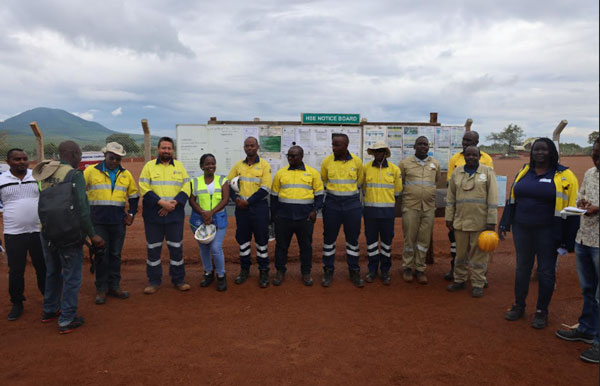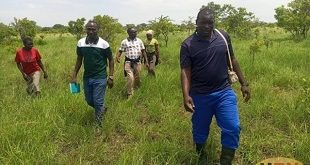
Hoima, Uganda | PATRICIA AKANGWATSA | The East African Crude Oil Pipeline (EACOP) project is making remarkable progress, with construction activities advancing steadily and a steadfast commitment to minimizing its social, economic, and environmental impact.
The crude oil project traverses 171 villages across 10 districts of Kabaale, Hoima, Kikuube, Kakumiro, Kyankwanzi, Mubende, Ggomba, Ssembabule, Lwengo, Rakai and Kyotera.
According to the project pipeline manager, Ahmed Arafat, the project is well on track to meet its completion deadline of 2026.
The project is poised to generate substantial benefits for Uganda, including job creation, revenue generation, and economic diversification.
While speaking to journalists on a four-day trip to the pipeline construction site last week, Lawerence Ssempagi the compliance regulatory lead at EACOP, said that they are employing a range of innovative and efficient construction techniques to minimize its impact on the environment and local communities.
“One notable innovation is the extensive use of horizontal directional drilling (HDD) to cross sensitive areas such as wetlands and rivers,” Ssempagi said.
HDD involves drilling a tunnel underground, allowing the pipeline to be installed without disrupting the surface environment.
“This technique minimizes disturbance to delicate ecosystems and protects water resources, ensuring a sustainable construction approach,” he added.
He also said that another innovative approach is the utilisation of prefabricated pipes.
“These pipes are manufactured off-site to stringent quality standards and transported to the construction site, where they are quickly assembled. This method reduces on-site construction time, minimizes waste, and ensures consistent quality standards, contributing to a more efficient and environmentally friendly construction process,”
EACOP is acutely aware of the potential social impact of the project on local communities and is committed to minimizing any disruptions.
“The company has implemented a comprehensive resettlement and compensation plan for affected households, ensuring fair treatment and support for those impacted by the pipeline’s development,” said Fred Bazara the community liaison officer at EACOP.
Bazara said that the resettlement plan provides fair compensation for land and property, as well as support for relocation, including assistance with finding new housing, transportation, and establishing new livelihoods. The plan recognizes the importance of social cohesion and ensures that families are resettled together, minimizing disruptions to their social networks.
“Over 90% of the project-affected persons have been compensated. Of these, only 210 wanted to have resettlement houses and so far, 117 replacement houses have been constructed, adding that 98% compensation agreement signing has been reached,”
To address potential disruptions to local livelihoods, EACOP is working closely with communities to develop livelihood restoration programs.
These programs provide training and support to help people affected by the pipeline find new jobs or start new businesses, empowering them to adapt to changes and secure sustainable livelihoods.
EACOP contracted Montrose an NGO to support the project-affected persons in doing the training, especially in agriculture.
EACOP is unwavering in its commitment to environmental protection and is taking all necessary precautions to minimize its environmental impact. The company developed a comprehensive environmental and social impact assessment (ESIA) that outlines the potential impacts of the pipeline and the measures that will be taken to mitigate them.
James Mukasa Ngubwagye the Biodiversity and environmental officer at EACOP said that ESIA identified several potential environmental impacts, including the risk of spills, habitat disruption, and impact on water resources.
“EACOP’s objective is to avoid impact on the environment and people and that is why we developed a range of mitigation measures to address these risks, ensuring that the project is carried out in an environmentally responsible manner”, Ngubwagye said.
 The Independent Uganda: You get the Truth we Pay the Price
The Independent Uganda: You get the Truth we Pay the Price



